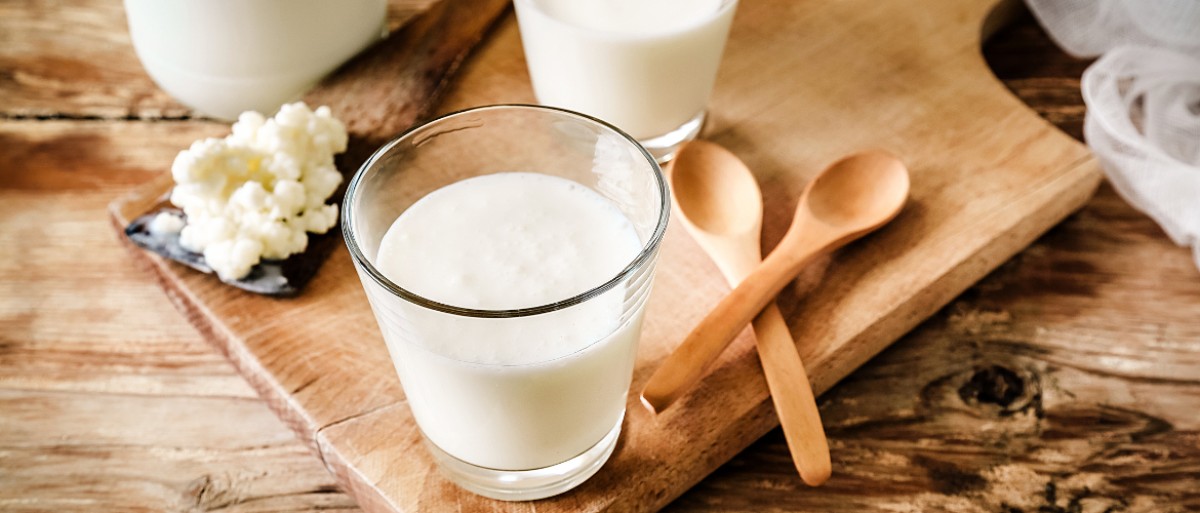What is kefir?
The
kefir is a drink packed with probiotics, which are beneficial bacteria for gut health. It is made by fermenting milk from cows, goats or sheep. There is also a different type
kefir which is made with water instead of milk. The
kefir it can aid digestion and contains many types of good bacteria. You can find it in stores or make it yourself at home.
Does it contain lactose?
The
kefir it contains some lactose, so if you have a problem with lactose, it may not cause you discomfort. In fact, it helps to better digest lactose. If you don't want any lactose, there are special versions
kefir dairy-free, but may not offer the same benefits.
Benefits of kefir
The
kefir, rich in probiotics and nutrients, helps the digestive system and intestines to function properly. In addition, its consumption can provide more
benefits for the health.
1. Reduces the risk of osteoporosisKefir is very beneficial for your bones because it contains calcium, but also other important nutrients such as vitamin D, phosphorus, magnesium and vitamin K. It has even been shown to help people with osteoporosis have stronger bones when consumed daily.
2. Improves heart healthResearch has found that the
kefir may offer protection against problems associated with metabolic syndrome, which can increase the risk for
heart problems. It
kefir it can help keep your blood pressure down, have better cholesterol levels, and improve your triglyceride levels, which are fatty substances in your blood. This can even help prevent heart problems in the future.
3. It helps digestionThe
kefir it has many types of bacteria, up to 61 different ones. Research has shown that these powerful microbes can be beneficial for gut health, helping to treat and prevent problems such as
Irritable Bowel Syndrome, some forms
diarrhea and ulcers caused by microbes.
4.Helps control blood sugarIf you have
diabetes type 2, adding
kefir in your diet can be beneficial. Research suggests that the
kefir may help lower fasting blood sugar and improve other related
diabetes factors such as insulin resistance and blood pressure. However, more studies are needed to be sure.
5. It has antibacterial propertiesThe
kefir it is good for health because it contains substances that fight bacteria. In particular, it has some types of probiotics, which are as powerful as antibiotics in
fighting bad bacteria. A type of probiotic found only in kefir, the
Lactobacillus kefir, it can even slow or stop the growth of bacteria that are dangerous to health, such as salmonella and E. coli.
Types of kefir
The
kefir available in many forms including:
- Kefir milk: The milk kefir is a drink made from fermented cow, goat or sheep milk and kefir grains.
- Water kefir: The kefir water is another fermented drink made with a mixture of sugar water and kefir grains. It is dairy free.
- Kefir grains: The grains kefir they are colonies of yeast and bacteria that look like small pieces of cauliflower. They have probiotic microorganisms that break down the lactose in milk, which causes fermentation. There are two types of kefir grains: water grains (which you mix with sugar water) and milk grains (which you mix with milk).
Kefir vs Yogurt
The
kefir is similar to
yoghurt. Both have a slightly sour taste and are made by fermentation. If you find it difficult to digest
lactose, both are good choices because you digest them easily. They also contain different beneficial bacteria. The
kefir it has mainly bacteria
Lactobacillus kefir, and yogurt has the bacteria
Lactobacillus bulgaricus and
Streptococcus thermophilus. Also, kefir also contains yeast, unlike yogurt which only has bacteria.
The
kefir it is runnier than yogurt and usually has
fewer calories and sugar. Both are great for making smoothies or combining with cereal or fruit, but kefir is a better choice if you want something with fewer calories and sugar.
Nutritional value of Kefir
A
cup of kefir low fat contains:
- Calories: 104
- Protein: 9 grams
- Fat: 2,5 grams
- Carbohydrates: 11,5 grams
- Fiber: 0 gr
- Sugar: 11 grams
Also
kefir it's a good source
:
How to make homemade kefir?
Make your own
kefir simply and quickly with these steps:
- Take it some milk (prefer whole for better taste), one glass jar and kefir grains. The grains are easy to find online.
- Put some teaspoons kefir grains in the jar along with 1 cup milk.
- Cover the jar with a clean towel kitchen towel or kitchen paper and squeeze it tightly with a rubber band.
- Leave the jar on Room Temperature for 24-48 hours. The milk will begin to curdle due to the fermentation process.
- Drain the fat kefir through a cloth upon a bowl, pressing gently to help drain.
- Keep them grains that will be left over for the next time you make kefir.
That's just how it is! You can enjoy your handmade kefir and repeat the process whenever you want.
How much kefir should I drink per day?
The
kefir it is a delicious and healthy choice for many diets. Aim at
1 to 3 cups daily, and alternate with various other fermented foods for more
probiotics.
However, some may need to watch their intake, especially if you're watching your carbs, following
ketogenic diet, or avoid alcohol. Also, if your immune system is weakened, consult a doctor before supplementing
kefir or similar probiotic-rich foods.
If it is
kefir not good for you, try drinking less or stopping to see if that helps.
Find on
wecare.gr the right vitamins you need!
Sources: 1.
What Are Kefir and Its Health Benefits?, 2.
Is Drinking Kefir Healthy for You?, 3.
Can You Drink Too Much Kefir?, 4.
Kefir: Health benefits, risks, and how to make it













